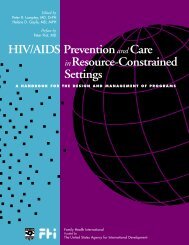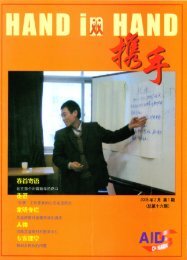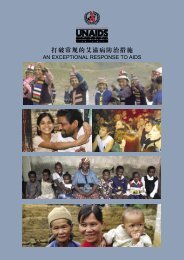The Training of Trainers Manual - UNFPA
The Training of Trainers Manual - UNFPA
The Training of Trainers Manual - UNFPA
You also want an ePaper? Increase the reach of your titles
YUMPU automatically turns print PDFs into web optimized ePapers that Google loves.
■ Is relationship oriented<br />
■ Addresses motivation, denial, and resistance on a personal level<br />
Have the participants brainstorm a working definition for peer counselling,<br />
ending with a definition that is close to this one: ‘Youth peer counselling is a<br />
situation where a young person turns to a trained person <strong>of</strong> his or her own age for<br />
understanding, assurance, and assistance in coping with a personal problem.’<br />
Part 2<br />
Next, ask participants to brainstorm about the kinds <strong>of</strong> problems for which young<br />
people seek support from a peer. List their responses on the flip chart. You can<br />
add the following examples if they are not mentioned: unhappiness (depression),<br />
difficulties in relationships with friends or adults (parent, teacher), problems related<br />
to school, problems related to sexual behaviour, unwanted pregnancy, substance<br />
abuse, etc.<br />
Lead a group discussion and reflection on following issues:<br />
■ Do peer educators in your programme all possess the qualities required to give<br />
appropriate support in dealing with the problems listed above Did they get<br />
specific training to do so<br />
■ What obstacles might stop them from giving proper support<br />
■ What might the dangers be if peers give inappropriate support<br />
Closure<br />
Point out that when a peer education programme is delivered, it is not uncommon<br />
for a young person from the audience to share a personal problem with one <strong>of</strong> the<br />
peer educators and ask for advice. In such a case, it is crucial that:<br />
■ <strong>The</strong> peer educator is a sensitive listener and has the required referral skills.<br />
■ <strong>The</strong> team <strong>of</strong> peer educators is supervised by competent adults to whom they<br />
can turn for advice.<br />
■ Peer educators need to realize that they may face sensitive and difficult issues,<br />
when they will need to be able to link to other services, counsellors, and<br />
trusted adults.<br />
At the end <strong>of</strong> this training segment, the facilitator highlights the differences<br />
between the three peer-led approaches – peer information, peer education, and<br />
peer counselling – which are summarized in Handout 13. Types <strong>of</strong> Peer-Led<br />
Approaches (B) (projected on a screen or shown on the flip chart). Distribute the<br />
handout.<br />
It should be stressed that the concept <strong>of</strong> peer counselling sometimes confuses<br />
people. In some situations, so-called peer counselling (for example, young people<br />
110 <strong>Training</strong> <strong>of</strong> <strong>Trainers</strong> <strong>Manual</strong>

















